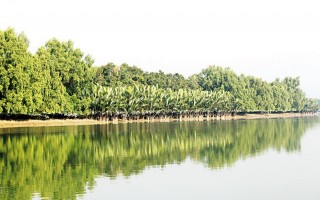Budget Thoughts in Time of COVID-19 Environment must be prioritised: experts
The upcoming budget should be the first in a series of new economic plans that the government may need to adopt in place of traditional plans in coming years in order to get over the coronavirus-like crises, experts said.
They said that the outbreak of the coronavirus pandemic was a direct result of human intervention in nature as countries around the world raced to increase GDPs at its cost.
‘Bangladesh needs to do exactly the opposite it has been doing the pre-pandemic time to recover from the coronavirus crisis and prepare for any future pandemics,’ economist Anu Muhammad told New Age.
He said that mere budgetary increases for nature and environment would make no difference unless the government changed its development philosophy.
The coronavirus first emerged in China, widely believed to have been passed onto human from a live animal market in Wuhan, and rapidly spread across the globe, straining the global health systems.
Bangladesh was caught off guard like many other countries with its poor healthcare infrastructure and people’s compromised immunity from exposure to environmental pollution.
Bangladesh has the world’s dirtiest air with health experts blaming massive infrastructure projects such as construction of big bridges and highways for deteriorating the air quality rapidly over the last decade.
International research organisations forecast that Bangladesh was on the way to becoming a carbon bomb with 29 mega coal-fired power plants planned along its coastline.
Numerous researches have shown that areas with air pollution have greater cases of coronavirus infection than areas with clean air.
They also showed that people suffering from diseases associated with environmental pollution were more likely to die of COVID-19.
Dhaka University chemistry professor Abdus Salam said that an overnight reduction in air pollution is possible just by strict regulation of the transport sector.
In Dhaka’s air, the concentration of black carbon released by cars is 12 microgram per cubic metre, far greater than 1 microgram per cubic metre or less in many cities in developed countries, he said.
Environmental pollution causes Bangladesh to lose three to five per cent of its GDP every year, he said.
‘It would make a huge difference if Bangladesh invested one per cent of its GDP in environmental research to stop environmental pollution,’ he said.
Experts also recommended changing policies such as making old cars costlier than new cars with environment-friendly technologies.
Jahangirnagar University geography and environment professor Manzurul Hassan said that brick kilns were responsible for 58 per cent of the country’s environmental pollution which could easily be reduced to five per cent by changing brick manufacturing technology or introducing alternative building materials.
The other major environmental polluters are different industries releasing untreated wastes into the environment, especially directly into water bodies, eventually contaminating the food chain with heavy metals, he said.
‘Bangladesh needs to immediately improve its waste management,’ said Manzur.
Almost all kinds of waste, including those from hospitals, are dumped in the open even in densely populated cities such as Dhaka, increasing the risks of the spread of many diseases.
Reducing traffic congestion could go a long way in healing the polluted air for it doubles car fuel burning inside the capital, said Manzur.
‘There are a lot of things that need to be immediately taken care of. But the problem is that the government does not care about environemnt,’ he said.
A 2018 World Bank report estimated that Bangladesh annually lost $6.5 billion because of environmental pollution and degradation.
The report said that 28 per cent of the total deaths in Bangladesh could be attributed to diseases caused by environmental pollution as one million people were likely facing lead exposure.
The report revealed that Dhaka lost 75 per cent wetland in last 40 years while Pabna half of its water bodies after 1990.
National River Conservation Commission reports showed that people continued to block rivers for building power plants and economic zones.
Bangladesh Poribesh Andolon vice president MA Matin demanded that the government invest more in strengthening the Department of Environment.
‘The sorry state of the DoE is reflected everywhere — in bald hills, barren forests, the threatened Sunderbans and artificially obstructed rivers,’ said Matin.
In the outgoing fiscal year the government had allocated Tk 14.96 billion for the ministry of environment and forest, up from Tk 13.40 billion allocated the year before.
More than half the budgetary allocation usually gets spent as operational cost.
Dhaka University geography and environment professor M Shahidul Islam said that nature was sure to react facing continued human intervention and the coronavirus crisis could represent a tiny sample of it.
‘Yet it seems to have made many of us realise the uselessness of owning so many things, the uselessness of money,’ said Shahidul.
‘It proved the uselessness of building so many infrastructures in the name of development,’ he said.
Shahidul said that the upcoming budget should not look like a traditional budget and must reflect lessons learned from the pandemic still sweeping the world.
‘Upset environment can endanger any amount of economic progress. Upset environment can bring us bad luck overnight,’ he said.
News Courtesy: www.newagebd.net











